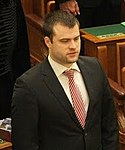This article needs additional citations for verification .(July 2019) |
| |||||||||||||||||||||||||||||||||||||||||||||||||||||||||||
All 33 seats in the General Assembly of Budapest 17 seats needed for a majority | |||||||||||||||||||||||||||||||||||||||||||||||||||||||||||
|---|---|---|---|---|---|---|---|---|---|---|---|---|---|---|---|---|---|---|---|---|---|---|---|---|---|---|---|---|---|---|---|---|---|---|---|---|---|---|---|---|---|---|---|---|---|---|---|---|---|---|---|---|---|---|---|---|---|---|---|
| |||||||||||||||||||||||||||||||||||||||||||||||||||||||||||
The 2010 Budapest Assembly election was held on 3 October 2010, concurring with other local elections in Hungary. This was the last election for the Assembly with party-list proportional rules until 2024, when this system was restored. The size of the Assembly was reduced from 66 members to 33 at this election.



